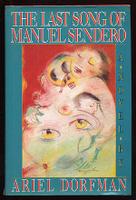The Last Song of Manuel Sendero by Ariel Dorfman
 An Experimental Novel on a Real Tragedy
An Experimental Novel on a Real Tragedy
I started reading the book with gusto and expectation. I had heard a lot about this Argentina born, Chilean citizen who had grown up in the United States of America and now lives in Chile 'whenever possible.' Then the book itself is about the Chilean socialist and democratic revoultion of September 1973. Salvador Allende, the Socialist President who came to power by democratic means and whose rule within weeks was overturned by the military Junta supported by the United States and much of the 'civilized world'. Dorfman was supporter of Allende. Allende himself, as is well- known, preferred to die a heroic death defying the upstart Chilean army- he was the stuff that legends are made of.
But the novel was somewhat of a letdown, and despite my grim determination to read through the novel, and many years after I renounced another novel midway- The Satanic Verses by Rushdie whom I admire as much as I do Dorfman. Like the Verses, the Last Song is allegorical, and is populated by a number of characters that defy space and time and a lot of rationality besides. The main theme of the novel is that a number of babies in their mothers' wombs decide not to be born till the world is worth living. There is Grandfather who joins in with the babies, apparently he is able to be their contemporary by his ability to live in nostalgia. Then there are characters who find documents from the time of Pinochet's regime ten thousand years henceforth and try to construct a historical record of the period.
Also in the bovel is a character called Carl Barks, evidently the opposite of Karl Marx. He is a cartoonist from the Walt Disney corporation and is hired by the Pinochet regime to create the image of the contemporary Chilean man. Obviously, as a caricature.
The novel brims with ideas and creative techniques, except that there are just too many of them and the novel seems to jump across them without seeming to tie the threads together.
I found the maze undecipherable and too stressful even for my not so limited patience. I spend a number of months trying to persist in reading a work- fiction or otherwise- if required, but finally, as I was mid- flight to San Francisco, and gazed down at miles after miles of the ravines in New Mexico and the deserts of Nevada, I gave up.
May be I will return to the novel again.
On the theme, however, I found 'In Chile by the Night' by Roberto Bolano a far better, simpler and enjoyable read. I didn't review the novel then, and you may be referred to the amazon site for the same.
No comments:
Post a Comment